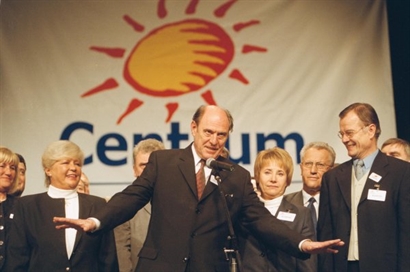 © Végel Dániel |
You went through a lot before becoming a tax reform guru in the Communist era. In 1958, you were imprisoned for distributing flyers protesting Imre Nagy's execution to students at Petofi Gymnazium. You were free to study on your release, but you had to work. But you still built a career. How did they grew to trust you?
It was all part of the Kadar normalisation. From 1975 onwards I worked for the Financial Research Institute, which collected up all the "politically dubious elements," eventually becoming deputy director. I joined the Finance Ministry in 1984 and was in charge of the department responsible for tax and budgetary reform. But I could only take on a senior role once it had been taken of the list of jobs needing approval in 1983.
Did the reform economists of the 1980s realise that they were paving the way for capitalism?
Some realised, but most had no thought of it. Most, including me, were thinking in terms of a social market in 1981, which we could persuade Moscow to accept. We were working on building a capitalist economy, certainly, but nobody believed the party state would collapse so swiftly. It's true that my father, who was a prisoner of war back in the day, used to say: "Son, the Communists will fall." But we were thinking of the long term, nobody thought the market would be free by 1990.
At the time it looked like Hungary was ahead of the neighbouring countries. The people in charge of the economy couldn't ignore the reform economists' ideas: not only the tax system was becoming more like the Western model, but there was even a two-level banking system by the mid-1980s, and the commercial banks that later played such an important role in the privatisation process had already been established.
Hungary began early on. There were attempts at reform as early as 1957, but the hard-liners thwarted them. Reform was more or less continuous from 1968 to 1986 under the guidance of Rezso Nyers, Marton Tardos and Janos Fekete. In 1981, Hungary joined the IMF and the World Bank, and from then on they forced us to open up our markets progressively by extending us more and more credit. The two-level banking system was also a Western demand.
It's interesting the Soviet Union did not stop us from giving into pressure from the Western banks. It served their interests indirectly, since the Hungarian economy played an important role in circumventing the COCOM blockages and in importing high technology to help in the arms race. To some extent we took on the role within the Eastern bloc that Czechoslovakia had played until the 1968 invasion. Of course, we know very little of that nowadays - it will be for historians to work out exactly what happened. But it is a fact that favourable external conditions helped us to implement those taxation reforms and devise a law on corporations, both of which speeded up the road to capitalism.
Thanks to the reforms of Jozsef Marjai, Istvan Hetenyi and Lajos Faluvegi, the Hungarian economy was in pretty good nick by 1985. Hungary's indebtedness had fallen to a sustainable level and the future seemed promising, since there were structural funds for further development. Then came the 1985 Party Congress when they pulled out all the stops and went on a spending spree the likes of which we saw after the 2002 elections. History repeats itself over and over again in economics.
There's no question that Jozsef Antall's government, in which you were Finance Minister for a good two years, inherited an appalling economy. Why didn't you ask for real information at the round table discussions?
Interesting idea. There was an economic dimension to the round table discussions. There were two committees. One was the Bridge Committee, chaired by Istvan Sarlos. I attended one of its sessions, but there were some extreme liberals there, who counted as hard-liners in those days, so I thought there was little point in spending time there. The main problem was that the negotiators were concentrating on building a state governed by the rule of law and a peaceful transition, and they forgot the need for clarity over the economy and for people to be brought to account for the catastrophic economic situation. There was no serious discussion of the economy in 1989 and 1990, though I myself made the budget figures available to the committees.
But you failed as Finance Minister to speed up the process of adaptation. Why?
In Hungary, when the financial situation starts to improve, people are no longer interested in structural reforms. That's what happened at the beginning of 1992, when Professor Sandor Lamfalussy wrote a letter to Jozsef Antall, the PM, as well as to Gyorgy Suranyi, president of the National Bank, and to me. He called for stabilisation, and said the time had come for genuine reforms - restructuring the budget, healthcare and social security. But the government didn't take this on board: if things were going so well, they thought, why do we need more reforms? The same mentality as in 1985 or 2002.
So you wanted continued economic reform in 1992. Who or what stopped you?
The government and the parties tied our hands. MPs notice when there's a crisis, but they start calling for spending as soon as it passes. That's what's been happening over the past five years as well. In 1992, we were ready to reform social security and healthcare, but I couldn't implement my ideas - I was forced to leave. Of course, Jozsef Antall offered me the transport portfolio, but I didn't accept it.
Second part of the article (Oldaltörés)
 © Végel Dániel |
Your successors then delayed the necessary measures until Lajos Bokros was forced to take some drastic steps - his cuts rebalanced the budget.
The great achievement of the 1994-98 period was that most incomes moved into the private sector and private pension funds were established. Politicians were too nervous to bring about other reforms. They forced people into commercial enterprises, gave them an interest in becoming "independent," but this had serious consequences for social security. They lost control of contribution payments, which has led to today's catastrophic deficit. Today's situation, where fewer than two million honest citizens working and paying taxes have to support the other eight million, could have been avoided if social security had been reformed. It didn't happen, and we're very late starting. I'd add that this wasn't yet the case when I was Finance Minister - social security was in surplus at the time.
In 2002, the Orban government lost the elections, even though they'd started a spending spree in their final two years in order to win. Many claim that the Centrum Party's 4 per cent of the vote in that election cost Fidesz their victory.
I don't agree. Istvan Stumpf's institute conducted a survey which showed that we took roughly as many votes from the Right as from the Left. I'd add that in 2006, the Socialist regarded Centrum as a danger mainly to themselves.
Let's talk about the explosive situation we're seeing at the moment, which is the result of introducing shock therapy in order to catch up with years of inactivity. Until now, it's always been possible to shift responsibility for difficult circumstances on external factors or the failing of predecessors. But now there are so many ad hoc, ill thought-out measures, that various groups are in a more or less permanent state of outrage.
I don't know why the government is hesitating when the governing parties' drawers were stuffed with ideas for reform. The era of "enlightened absolutism" passed a long time ago. It would have made sense to hold consultations before moving, but the government missed that opportunity.
Will the Hungarian economy have the capacity to absorb EU subsidies?
It will be hard to spend those trillions of EU forints rationally. Brussels monitors the way its money is spent very strictly, but there is still a risk of the money being wasted: Hungary's public administration is too centralised. The local authorities are powerless, the smaller regions either work or they don't, and the large regions just exist on paper. Nobody has any money, or rather, everything depends on the benevolence of central government, because there has been no effort to reach a compromise at lower levels of government. There are huge risks.
How important is public support in these circumstances? How can the government expect citizens to be honest, to pay ever higher taxes and contributions if a large number of politicians see themselves as being above the law and conduct their financial affairs accordingly?
I'd say that politicians don't have to be saints, but they have to realise that they act as a role model for other members of society. If the ruling class sets a bad example, and if justice is inconsistent, then it is simply impossible to establish the truth, and we can't expect much good to come of it.
János Pelle
















